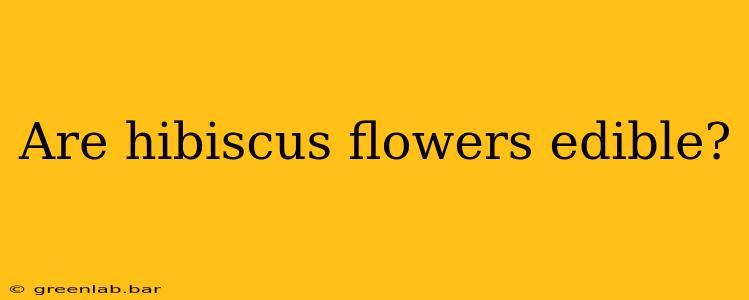Hibiscus flowers, with their vibrant colors and delicate beauty, grace gardens and adorn tropical landscapes worldwide. But beyond their aesthetic appeal lies a world of culinary and medicinal uses. The question, "Are hibiscus flowers edible?" is a resounding yes, but with important nuances to consider. This article delves into the edibility of hibiscus flowers, exploring their various uses, potential benefits, and precautions.
Which Hibiscus Flowers Are Edible?
Not all hibiscus varieties are created equal when it comes to culinary applications. While many are safe for consumption, others may be unpalatable or even toxic. The most commonly used edible hibiscus species include:
-
Hibiscus sabdariffa: This species, also known as roselle, is widely cultivated for its calyces (the fleshy part surrounding the fruit), which are used to make hibiscus tea, jams, and jellies. Its tart flavor profile makes it a popular ingredient in both sweet and savory dishes.
-
Hibiscus syriacus: Often called the rose of Sharon, this species' flowers are also edible, though they are less commonly used than roselle. Their flavor is more subtly floral and less tart.
-
Hibiscus tiliaceus: Also known as sea hibiscus, this species has edible flowers, but they are generally not used as widely as other varieties due to their less pronounced flavor.
Important Note: Before consuming any hibiscus flower, positive identification is crucial. There are many hibiscus varieties, some of which are not edible and may even be toxic. If you're unsure about the specific type of hibiscus, it's best to err on the side of caution and avoid consumption. Consult with a botanist or experienced forager for help with identification.
Culinary Uses of Edible Hibiscus Flowers
Edible hibiscus flowers add a unique touch to a variety of culinary creations:
Beverages:
-
Hibiscus Tea: This is perhaps the most well-known use of edible hibiscus. The tart and slightly tangy flavor makes it a refreshing beverage, often enjoyed hot or cold.
-
Cocktails and Mocktails: Hibiscus flowers lend a beautiful color and unique flavor to cocktails and mocktails. They can be infused into syrups or added directly to drinks for a visually stunning and flavorful experience.
Food Applications:
-
Salads: Edible hibiscus petals add a splash of color and subtle floral notes to salads. Their slightly tart flavor complements various greens and vegetables.
-
Jams and Jellies: The calyces of Hibiscus sabdariffa are frequently used to make delicious jams and jellies, boasting a vibrant red color and tangy taste.
-
Sauces and Chutneys: Hibiscus flowers can be incorporated into sauces and chutneys to add a unique flavor dimension.
-
Desserts: Candied hibiscus flowers are a popular garnish for cakes, pastries, and other desserts.
Potential Health Benefits
Beyond their culinary applications, hibiscus flowers are also associated with several potential health benefits. Research suggests that hibiscus may help lower blood pressure, improve liver health, and possess antioxidant properties. However, more research is needed to confirm these benefits fully. It's crucial to remember that hibiscus should not be considered a replacement for medical treatment.
Precautions and Considerations
While generally safe for consumption, some individuals may experience adverse reactions to hibiscus. These can include allergic reactions such as skin rashes or digestive upset. Those with known allergies should exercise caution. Additionally, pregnant and breastfeeding women should consult with their healthcare provider before consuming hibiscus in significant quantities.
Conclusion: A Delicious and Potentially Beneficial Flower
The answer to "Are hibiscus flowers edible?" is a qualified yes. However, careful identification and understanding of the various species are crucial. With proper precautions, edible hibiscus flowers offer a delightful culinary experience and a potential source of health benefits. Their vibrant colors and unique flavors make them a valuable addition to both sweet and savory dishes, adding a touch of elegance and exotic flair. Remember always to prioritize safety and accurate identification before incorporating hibiscus flowers into your diet.

